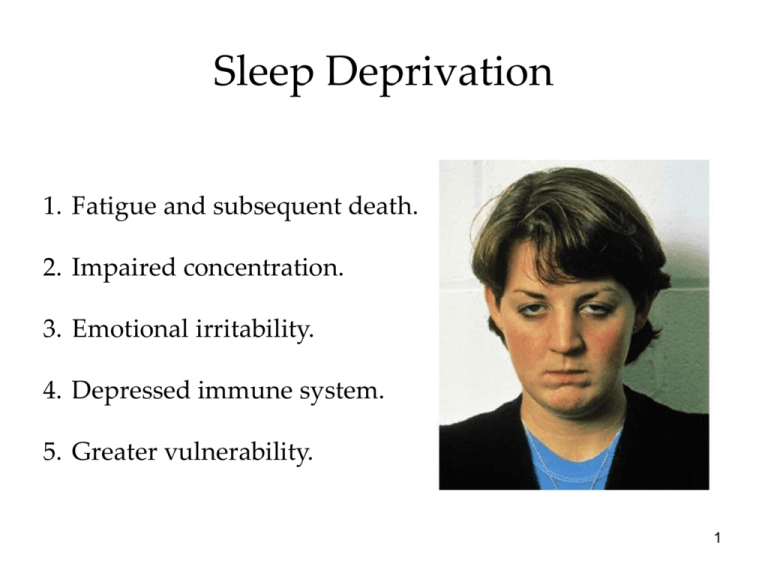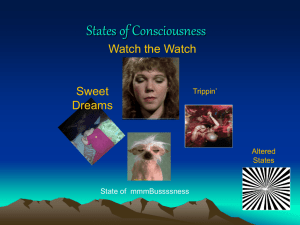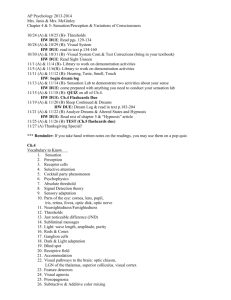
Sleep Deprivation
1. Fatigue and subsequent death.
2. Impaired concentration.
3. Emotional irritability.
4. Depressed immune system.
5. Greater vulnerability.
1
Accidents
Frequency of accidents increase with loss of sleep
2
Sleep Theories
1. Sleep Protects: Sleeping in the darkness when
predators loomed about kept our ancestors out
of harm’s way.
2. Sleep Recuperates: Sleep helps restore and
repair brain tissue.
3. Sleep Helps Remembering: Sleep restores and
rebuilds our fading memories.
4. Sleep and Growth: During sleep, the pituitary
gland releases growth hormone. Older people
release less of this hormone and sleep less.
3
Sleep Disorders: Insomnia
1. Somnambulism: Sleepwalking.
2. Nightmares: Frightening dreams that wake
a sleeper from REM.
3. Night terrors: Sudden arousal from sleep
with intense fear accompanied by
physiological reactions (e.g., rapid heart
rate, perspiration) that occur during SWS.
4
Sleep Disorders: Insomnia
4. Narcolepsy: Overpowering urge to fall
asleep that may occur while talking or
standing up.
5. Sleep apnea: Failure to breathe when
asleep.
5
What do we Dream?
1. Negative Emotional Content: 8 out of 10
dreams have negative emotional content.
2. Failure Dreams: People commonly dream
about failure, being attacked, pursued,
rejected, or struck with misfortune.
3. Sexual Dreams: Contrary to our thinking,
sexual dreams are sparse. Sexual dreams in
men are 1 in 10; and in women 1 in 30.
4. Dreams of Gender: Women dream of men
and women equally; men dream more about
men than women.
6
Why do we dream?
3. Physiological
Function: Dreams
provide the sleeping
brain with periodic
stimulation to
develop and preserve
neural pathways.
Neural networks of
newborns are quickly
developing; therefore,
they need more sleep.
8
Why do we dream?
4. Activation-Synthesis Theory: Suggests that the
brain engages in a lot of random neural
activity. Dreams make sense of this activity.
5. Cognitive Development: Some researchers
argue that we dream as a part of brain
maturation and cognitive development.
All dream researchers believe we need REM sleep. When
deprived of REM sleep and then allowed to sleep,
we show increased REM sleep called REM Rebound.
9
Dream Theories
Summary
10
Hypnosis
http://iddiokrysto.blog.excite.it
A social interaction in
which one person (the
hypnotist) suggests to
another (the subject)
that certain
perceptions, feelings,
thoughts, or behaviors
will spontaneously
occur.
Hypnos: Greek god of sleep
11
Mesmerism
http://www.general-anaesthesia.com
Credit for the popularity
of hypnosis goes to
Franz Anton Mesmer, a
physician, who
mistakenly thought he
discovered “animal
magnetism.” Some of his
patients experienced a
trancelike state and felt
better upon waking up.
Franz Mesmer (1734 - 1815)
12
Aspects of Hypnosis
1. Posthypnotic Suggestion: Suggestion carried
out after the subject is no longer hypnotized.
2. Posthypnotic Amnesia: Supposed inability to
recall what one experienced during hypnosis.
13
Facts and Falsehood
Those who practice hypnosis agree that its power
resides in the subject’s openness to suggestion.
Can anyone experience hypnosis?
Yes, to some extent.
Can hypnosis enhance recall of
forgotten events?
No.
14
Facts and Falsehood
Can hypnosis force people to act
against their will?
No.
Can hypnosis be therapeutic?
Yes. Self-suggestion
can heal too.
Can hypnosis alleviate pain?
Yes. Lamaze can
do that too.
15
Is Hypnosis an Altered State of
Consciousness?
Courtesy of News and Publications Service, Stanford University
1. Social Influence Theory:
Hypnotic subjects may
simply be imaginative
actors playing a social
role.
2. Divided Consciousness
Theory: Hypnosis is a
special state of
dissociated (divided)
consciousness (Hilgard,
1986, 1992).
(Hilgard, 1992)
16
Mimi Forsyth
Both Theories
17
AP Exam
• Know sleep theories (why we sleep) and
hypnosis
18



